Books and exams surrounded
Not only the story of low salary, every year secondary school teachers like Ms. La Thanh Thao (35 years old, Long Bien, Hanoi ) also face dozens of big and small exams, from professional fields to non-professional competitions such as law, traffic, union... In addition to directly participating, teachers also have to guide students to do the exam to submit.

In addition to professional expertise, teachers are under a lot of invisible pressure from books, regulations, and annual competitions. (Illustration photo)
The biggest fear for Ms. Thao in 12 years of teaching is the exam for excellent teachers, which is inspected once a year. She still remembers the year 2018, when she was chosen by the school to participate in the city-level exam for excellent homeroom teachers, as one of the three representatives of the school, she prepared carefully from the district round, learning from experienced teachers from previous years.
"Taking the exam is not only for myself but also for the image of the school. I remember in the two months leading up to the exam, I lost 4 kilos because I was nervous and had to prepare a lot from the content, methods, structure of the lesson plan...", she recounted.
Over the years, the story of teachers' records has been widely reported, but until now this situation has not decreased, and has even become more serious, especially when the education sector deploys and implements the new general education program.
Just evaluating students' learning outcomes at the end of each semester also puts pressure on teachers. As a homeroom teacher, Ms. Thao also has to evaluate the behavior of her students at the end of the year. Thus, just counting the evaluation in this first semester, she has to evaluate (twice) nearly 1,000 students (both on handwritten personal grade books and entered into electronic software).
A school year has 9 months, the most nightmare month for secondary school teachers, especially homeroom teachers, is the second semester of grade 9. They are under pressure from the end-of-year report card results, students' exams, especially the entrance exam for grade 10 high school.
Ms. Thao and many of her colleagues are the same. She shouldered the task of ensuring that all students in the class passed the exam, passed their first choice, and ensured a high passing rate for the entire school. The results of the 10th grade entrance exam are an important criterion for ranking the school's educational quality. If she herself did not meet the assigned target, the school and her colleagues would evaluate her professional capacity.
During the last months of the sprint, Ms. Thao was often absent from home, her husband and children were sent to their grandparents to take care of them. Every day she was at school teaching extra classes until 7-8 pm, not to mention many teachers who regretted their jobs and took extra classes to practice exam questions from 8-10 pm.
When she got home, she just wanted to lie down on the floor and breathe, her back was tired, her hands ached from writing on the chalkboard continuously from 8am to 8pm. Many times she wanted to quit her job to choose another path, but her husband and family saw her hardship and advised her to choose again.
Pressure to innovate the program
As one of more than 9,000 teachers who quit their jobs last school year, Ms. Tran Hoai Phuong (39 years old, former primary school teacher in Thai Nguyen ) said that salary is only one part, the biggest reason she quit her job was the pressure to innovate the teaching program.
This is the fourth year of gradually transferring classes from the old general education program to the new general education program. The change is not only in content, knowledge, and methods, but also in the completely different educational goals.
To keep up with the spirit of the new general education program, teachers, in addition to their teaching time at school, also try to attend many training courses on professional and program matters. For each change or reform, teachers spend months of training and practice to understand and implement it correctly.
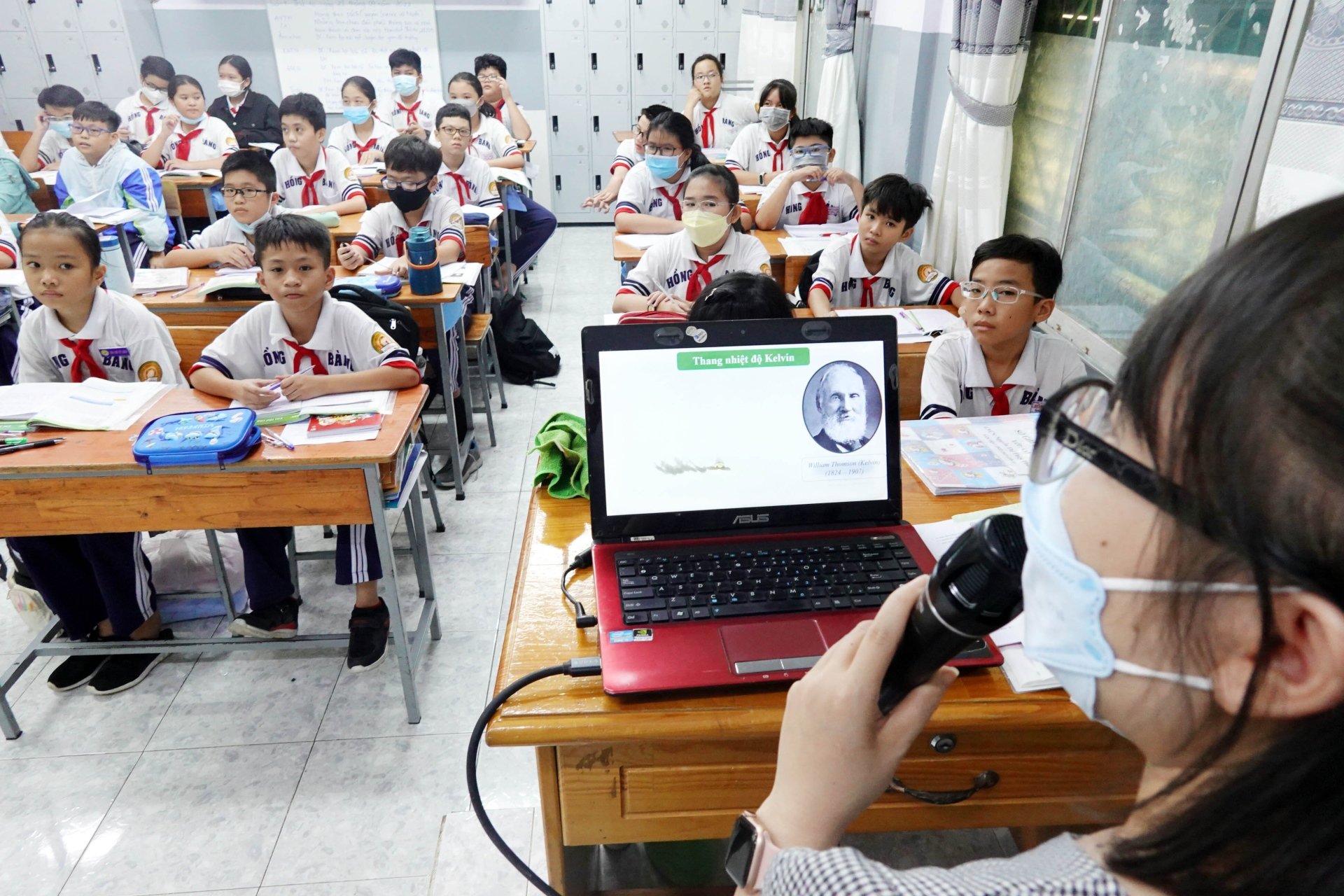
Curriculum innovation puts pressure on teachers as they have to take on additional tasks that are not in their field of expertise. (Illustration photo)
With a bachelor's degree in Literature Pedagogy and 16 years of experience teaching at the elementary level, when implementing the new general education program, Ms. Phuong was chosen by the school board and assigned to teach additional integrated subjects such as History - Geography. Occasionally, she was assigned to "fix the schedule" to teach some content related to local education.
"Every time I receive a task, I strain myself, skip meals and drinks, train, study books and prepare lesson plans. For me, losing 2-3 kg after each professional assignment has been normal for the past 4 years," the female teacher said.
At Ms. Phuong's school, many English, Music, Art, and Physical Education teachers are assigned to teach Natural and Social Sciences; Experiential Activities; Civic Education... so that there is no overtime pay for homeroom teachers, and no specialized teachers are left without teaching hours. Due to the severe shortage of teachers, other teachers have to share the burden, "whoever is assigned to teach a subject must be trained in that subject so they can teach in class as usual".
The 39-year-old former teacher realized that, once teaching is not in the right field, not only teachers but also students will have a hard time. Teachers who teach outside their field will have difficulty achieving good results, leading to students having difficulty absorbing the lesson. Of course, the quality of teaching and learning will also be affected.
'Bad students are the fault of... teachers'
Ms. Nguyen Thi Tuyet (32 years old), a private kindergarten teacher in District 5, Ho Chi Minh City, said that the teaching profession nowadays is both hard and poor. Teachers are placed on the shoulders of a heavy task by society and parents, which is to educate their students and children to become talented and virtuous people.
The female teacher, originally from Tien Giang, studied pedagogy in Ho Chi Minh City. After graduating, she was unable to get into the public system, so she worked at a private kindergarten. "The children of the families are all precious branches and leaves, the teachers are no more or less than nannies. In the morning, they pick up the children, in the afternoon, at 6 pm, the families pick them up, surveillance cameras are installed around the school and classrooms," Ms. Tuyet said.
Children aged 3-5 are very active and mischievous, and one careless move that causes a misunderstanding can have dire consequences for the teacher. Last week, she witnessed a colleague being severely scolded by parents when they saw the teacher pointing and glaring at the child when he hit another child and when they came home, they discovered bruises on the child's buttocks.
Despite the teacher's explanation, the parent took a photo, posted it on Facebook, and sent it to the principal to criticize with sharp words like "murderer", "child-beating witch", and then the parent concluded that the teacher had beaten their child.
The young teacher burst into tears and panicked at the insults and slander from parents and the online community. Although she was later cleared of all charges, the child's butt was bruised after falling while playing with his friends in the yard, which was recorded by a camera, but she still suffered a great blow. She had to take a month off work to stabilize her mind.
"I never thought that the teaching profession was so cheap. I was always afraid that parents would misunderstand that we often beat, yell at, and threaten children. Because of that, my colleagues and I often saw children misbehaving but we had to 'let them be naughty, yelling at them will bring trouble'," the young teacher shared.
Once a victim of being humiliated by parents, Ms. Nguyen Minh Nghia, Nguyen Thi Dinh Primary School (HCMC) admitted that "the teaching profession today faces too many dangers". There is no other profession like teaching where every day going to class brings with it a state of fear. They are afraid that parents can enter the school and commit violent acts at any time. "All moral values are turned upside down by the distorted view of teachers ", she said.
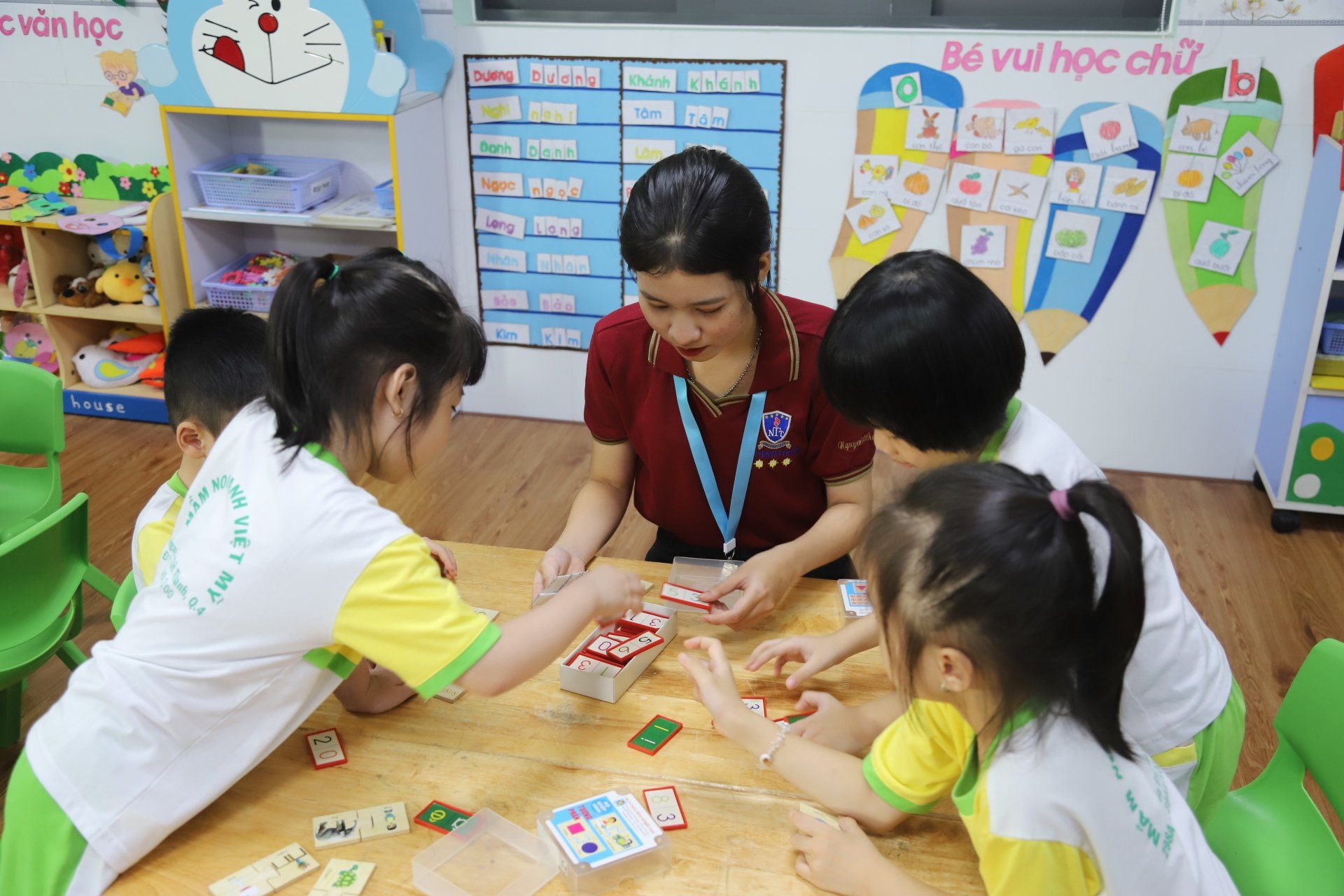
Teachers hope to live with their profession, without having to endure unnecessary pressure. (Illustration photo)
Teachers have to endure all kinds of pressure from the state management mechanism, in teaching and learning, and other relationships. There are teachers who have been in the profession for many years, achieved many titles, but just because there are no recruitment targets, one day their contracts are terminated and they become unemployed.
How to 'unleash' teachers?
According to delegate Nguyen Thi Viet Nga - Hai Duong delegation, in addition to low salaries, pressure in teaching, and unmotivating working environment, teachers quit their jobs.
She frankly said that we talk a lot about how to attract talents in different fields but seem to forget to pay attention to the pedagogical sector. Only 2-3 localities have announced to recruit talents with huge salaries, recruiting directly to the payroll, the rest of the localities have not had any additional incentives for the teaching staff. Even the criteria to determine the team of good teachers are not specific, only evaluated through the annual organization of excellent teaching competitions or meetings and seminars.
To solve the problem of teachers leaving the profession en masse, Ms. Nga stated that a more comprehensive solution is needed rather than focusing on solving a single problem. Salary solutions or attracting and giving incentives to talented people are just some of the solutions, while a comprehensive solution needs to be studied more carefully.
Firstly, education reform, new general education programs, textbooks. These reforms are very necessary but the education sector is innovating continuously, too much and too often. This puts a lot of pressure on teachers. We need stability for a certain period of 5-10 years or more.
Teaching, assessment and testing all need to be stable. Too many changes will cause bad disruption to students and create unnecessary pressure on teachers. Today we have one regulation, tomorrow we have another regulation, each time we change the regulation, it puts pressure on teachers.
Second, the issue of improving moral education for students in schools. The cultural behavior between parents, students and teachers also needs attention. There are small-scale incidents between teachers and students in the class, but parents get involved, react quite extremely, excessively, causing pressure on teachers.
Many teachers complain that they do not know how to teach their students in class. In the past, the old saying was “spare the rod and spoil the child”, but nowadays teachers do not dare to scold harshly for fear of making parents angry. Meanwhile, at home, parents use many different methods.
The results of students' learning, training, and self-cultivation are all on the teachers. They have to take responsibility for that, so they feel a lot of pressure.
The female National Assembly delegate of Hai Duong province suggested that the Government and the Ministry of Education and Training should soon resolve the suffocation in the current educational environment so that teachers can feel secure in their profession, helping them feel comfortable and love their job. We need to create a favorable and safe working environment for teachers. Since the past, the education sector has always promoted the slogan "Every day at school is a happy day" for students, so we should also think about how to make every day at school a happy day for teachers.
Source


![[Photo] Hanoi morning of October 1: Prolonged flooding, people wade to work](https://vphoto.vietnam.vn/thumb/1200x675/vietnam/resource/IMAGE/2025/10/1/189be28938e3493fa26b2938efa2059e)





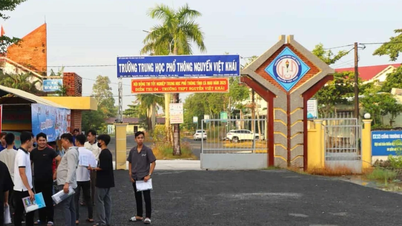





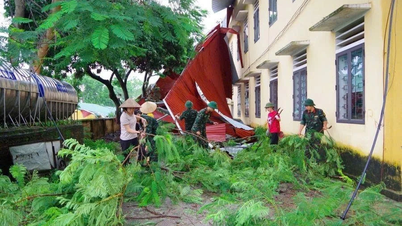


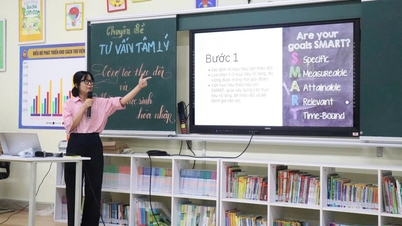
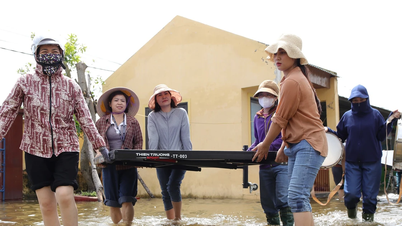





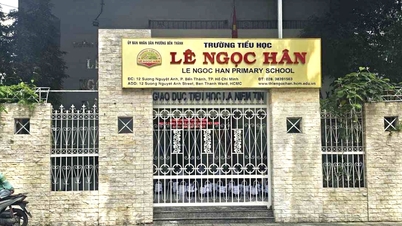











![[Photo] President Luong Cuong receives President of the Cuban National Assembly Esteban Lazo Hernandez](https://vphoto.vietnam.vn/thumb/1200x675/vietnam/resource/IMAGE/2025/9/30/4d38932911c24f6ea1936252bd5427fa)
![[Photo] The 1st Congress of Phu Tho Provincial Party Committee, term 2025-2030](https://vphoto.vietnam.vn/thumb/1200x675/vietnam/resource/IMAGE/2025/9/30/1507da06216649bba8a1ce6251816820)
![[Photo] Panorama of the cable-stayed bridge, the final bottleneck of the Ben Luc-Long Thanh expressway](https://vphoto.vietnam.vn/thumb/1200x675/vietnam/resource/IMAGE/2025/9/30/391fdf21025541d6b2f092e49a17243f)




























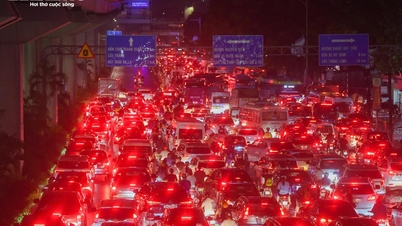





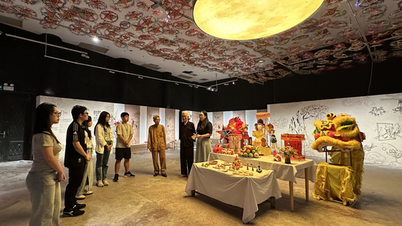










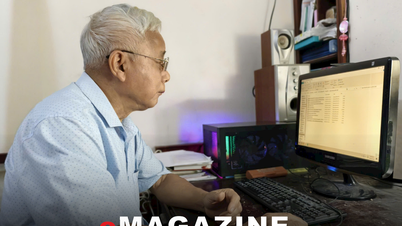

















Comment (0)